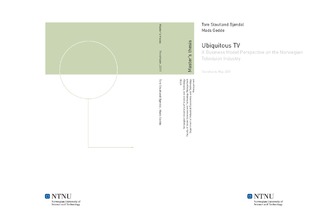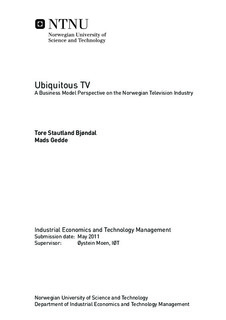| dc.contributor.advisor | Moen, Øystein | nb_NO |
| dc.contributor.author | Bjøndal, Tore Stautland | nb_NO |
| dc.contributor.author | Gedde, Mads | nb_NO |
| dc.date.accessioned | 2014-12-19T14:27:58Z | |
| dc.date.available | 2014-12-19T14:27:58Z | |
| dc.date.created | 2012-03-04 | nb_NO |
| dc.date.issued | 2011 | nb_NO |
| dc.identifier | 507343 | nb_NO |
| dc.identifier | ntnudaim:5899 | nb_NO |
| dc.identifier.uri | http://hdl.handle.net/11250/266027 | |
| dc.description.abstract | The Internet is an emerging distribution channel for television content that will deeply impact industry incumbents in the long term. This master thesis explores what challenges are brought forth in this industry by the possibility of Internet distribution of TV and how these issues should be addressed from the business model perspective of incumbent distributors in the Norwegian television market.There have been tremendous developments in Internet related infrastructure over the last decade. Combined with other industry developments this have led to the introduction of several new OTT-services that offer the consumer increased convenience and lower price points at the expense of lower quality. Overseas the development has come even further than in Norway and new entrants are challenging incumbents and stealing market share.However, the emergence of the Internet as a distribution channel for TV-content has brought forth numerous complications for existing incumbents. An explosive growth in Internet data traffic tied to online video consumption is straining the existing infrastructure. Distributors want content providers to cover parts of the costs for expanding infrastructure capacity, while content providers argue that consumers are already paying for Internet traffic. Another challenge is increased competition for end-consumer ownership with the introduction of OTT-services. The consumer behavior is also changing towards wanting to increase the share of content consumed on-demand, and to have the content available on multiple devices. The industry challenges combined are forcing incumbents to take action. Traditional distributors of TV have not been able to build a holistic business model that supports the new environment, in fear of extensively cannibalizing their existing model.This paper maintains that industry incumbents need to shift away from their reactive behavior with regards to technological development, and to start focusing on what value they can deliver to consumers. Our suggested new value proposition is to offer a highly personalized TV-service that is available on all types of screens, can be accessed at the consumers convenience, does not discriminate on content, and which is focused on providing a superior user experience.The value proposition entails shifting focus from proprietary networks to network agnostic distribution platforms. Broadcasted and on-demand TV should be supported equally and integrated seamlessly across the platform, without the silos that exists between the two today. For distributors to align their business model to this value proposition, they must carry out the following activities: 1) Develop a platform for TV-services that supports video-on-demand. 2) Make sure the platform can be used with all distribution channels. 3) Adapt the platform to support a ubiquitous experience across multiple screens and devices. 4) Create a vast library of content by aggregating different sources and negotiating rights. 5) Create a seamless integration and user experience across the platform. 6) Maintain a focus on traditional linear broadcasting to support live events and the social TV-experience.For all of this to take place management must first and foremost come to terms with the fact that the industry around them is changing. This entails starting to experiment with new business models alongside their existing model, regardless of the risk of cannibalization. Not getting involved in the emerging market can be even more dangerous than failing at the first attempt. Catching up once one is lagging behind will be extremely difficult. | nb_NO |
| dc.language | eng | nb_NO |
| dc.publisher | Institutt for industriell økonomi og teknologiledelse | nb_NO |
| dc.subject | ntnudaim:5899 | no_NO |
| dc.subject | MTIØT Industriell økonomi og teknologiledelse | no_NO |
| dc.subject | Strategi og internasjonal forretnmingsutvikling | no_NO |
| dc.subject | | no_NO |
| dc.title | Ubiquitous TV: A Business Model Perspective on the Norwegian Television Industry | nb_NO |
| dc.type | Master thesis | nb_NO |
| dc.source.pagenumber | 120 | nb_NO |
| dc.contributor.department | Norges teknisk-naturvitenskapelige universitet, Fakultet for samfunnsvitenskap og teknologiledelse, Institutt for industriell økonomi og teknologiledelse | nb_NO |

